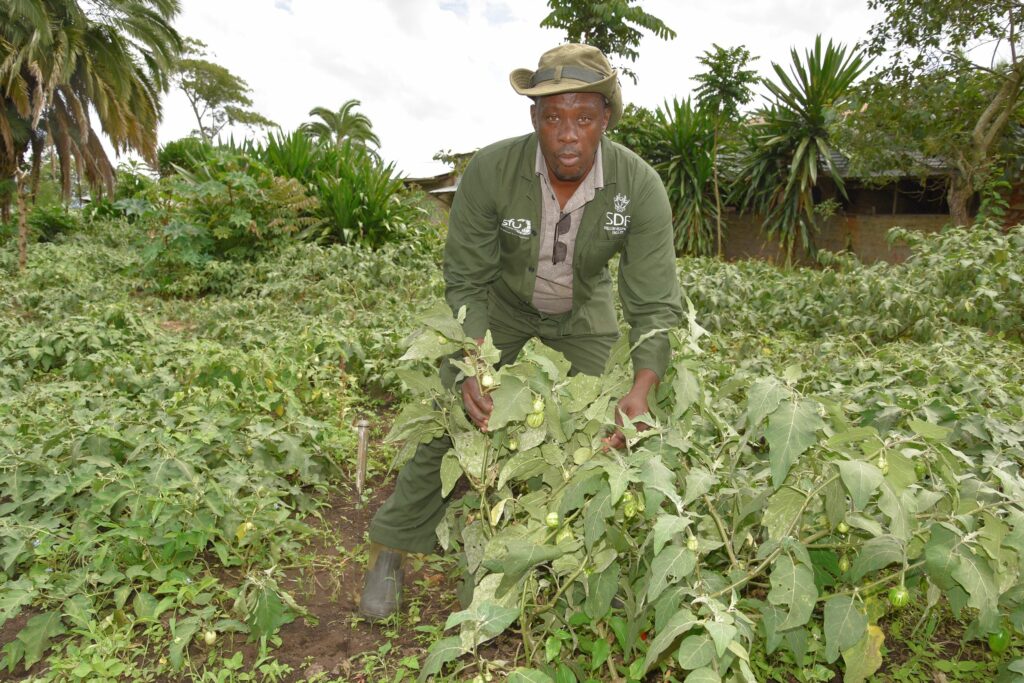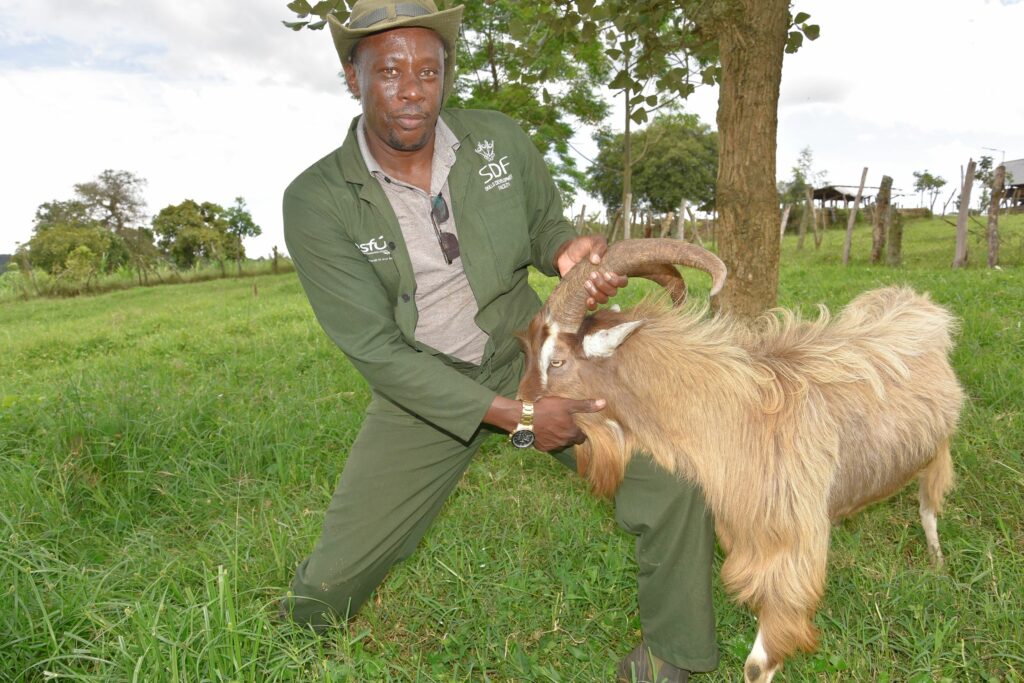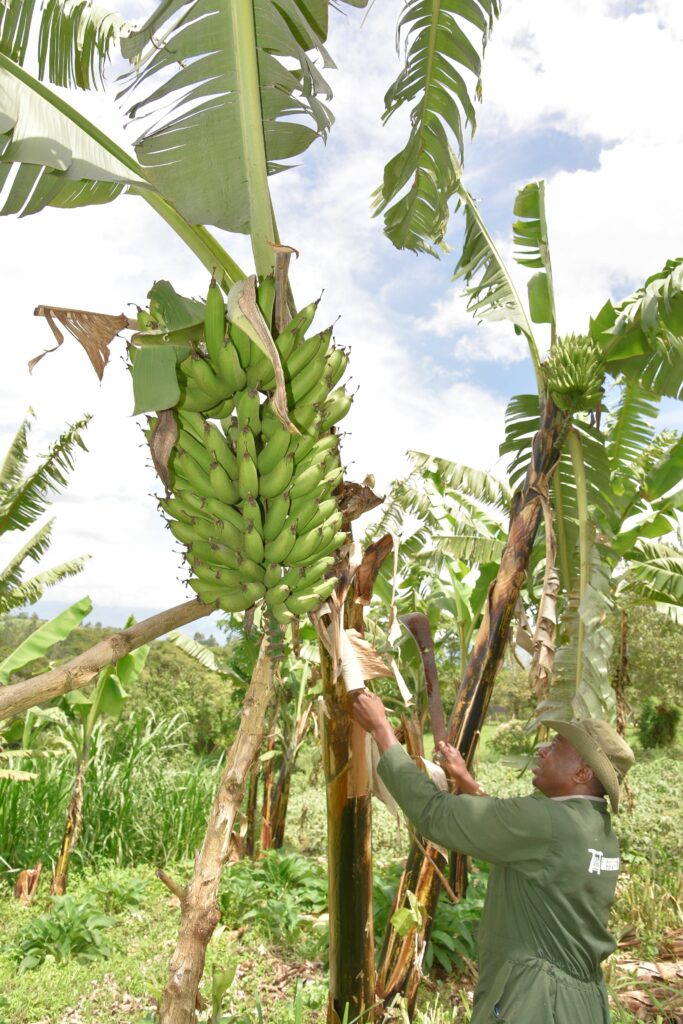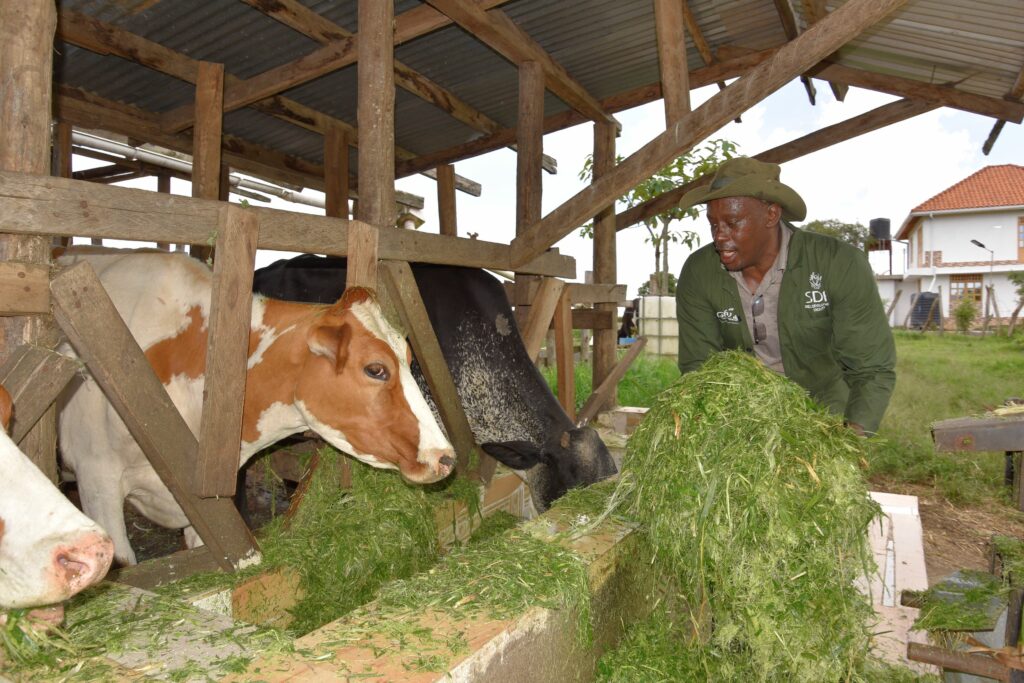By Umar Nsubuga
Nyabongo is a household name in Kabarole district, not for any other reason but research for animal feeds. The local residents refer to him fondly as dairy meal researcher.
Samuel Nyabongo Kimoome, the proprietor of Kimoome Mixed Farm.
The 53-year-old farmer studied B.Com at the university and has invested heavily in research to get to the top. He visited many farms and he has also attended trainings at different levels in Uganda and in the neighbouring countries, and has done research in farming and animals’ pasture.
In fact, most plants on his farm are a rare commodity locally as he imported them Netherlands, he says he decided to bring some pastures because he knew they could grow well in Uganda.
“I research about the crops I grow as well as the grasses my animals eat,” he says.
Nyabongo’s farming empire sits on 40 acres of land in Kanyate village, Kyakaigo parish in Kabarole district. He grows animal grasses such as signal grass, cayman, cobra, Mombasa, mulato, desmodium, napier, calliandra, spearmint and rosemary, among others.
He also grows bananas, maize, and garden eggs. He rears cattle, and goats on a large scale, and is a farmer trainer.

Background
Nyabongo was born and raised in Kabarole district in western Uganda. His parents had formal jobs, and also engaged in farming.
“My parents mainly had dairy cows. They also grew some crops. During the holidays, I participated in these activities and discovered that they brought in good money for the family,” he says.
This left an indelible mark on me, Nyabongo says after graduating, at Makerere University he went to the US and spent six years there. He was drawn to farming while in the US.
“I was intrigued by what I saw in US. With limited arable land, farmers were doing commercial farming better than I had ever seen in Uganda. I felt compelled to do something about farming because Uganda is blessed with better land than many other countries and a conducive environment for farming,” he says.
Upon his return from US, in 2001 Nyabongo immediately acquired land and started farming.
Nyabongo says he started small six years ago when he was staying in Makindye in the city suburb on the zero grazing and he started with two cows of Friesians.
“I started small, with few cows, and traditional crops grown in the area which included Napier grass and banana peels, feeding was a challenge.”
However, he says, he did not give up, opting to concentrate on grass.
Late, he bought 40 acres, of land and paid in instalments in his home village in Fortportal
“After getting land, immediately, I chose pasture because I was familiar with it and I knew that with enough grass I would manage any number of animals because the land is enough and if the grass is also there, I will be in profits. In fact, I have all most 15 acres of pasture,” he says.

Journey into dairy farming
“I had two dairy cows at the time and their milk production was good. They used to produce over 40 litres of milk daily,” he says.
Nyabongo slashed all the trees on the land he bought and planted pasture. He acquired four more dairy cows and each was at sh5m and one he got semen from South Africa and its breed is Gillard.
“When I was in South Africa, I was impressed with a dairy cow because every day you can get money from milk,” he says.
Nyabongo rears only dairy cows and all are under zero-grazing. The farm has grown to 26 cows, red Friesian, and Holstein Friesian “I get 140 litres of milk daily and sell each sh1,300, which brings me sh182,000.”
Before becoming a commercial farmer, he says, he used to emulate what he had learnt from other farmers, the US and on the Internet.
“I set up a forum and so far, we are 100 farmers, it’s because I want to learn day by day.
My passion is a dairy meal for the animals and I sell seedlings cheaply because today could be me with good grass and the next day could be another farmer with it.
Dairy goats
Roselyn Nyabongo the wife says she encourage her husband to start the goat rearing and this started five ago.
She says goats are easily converted into money given their size and so can come in handy when it comes to domestic needs such as school fees, medical bills and other necessities.
Nyabongo says this took about sh1.5m and he started with seven goats
Although it is an established fact that goat milk is nutritious, Nyabongo’s attempts to popularise it locally have not yet been well-received.
“Goat milk is a better immunity booster than cows. Currently, I have 120 hybrid goats on the farm, but my long-term plan is to have more goats so that I can process their milk to fight conditions such as rampant malnutrition,” he says.
Nyabongo’s young goats are mated from age of 12 months. He sells his young goats at sh200,000 but the old ones at sh350,000. He also sells a litre of goat’s milk at sh3,000.

Banana shamba
Nyabongo’s banana shamba sits on three acres he started this project six years ago. According to and it’s doing well and he sells over 20 bunches of matooke every three weeks.
However, the innovation that he uses makes the banana shamba stand out. To boost production on the banana plantation, he is replanting and he has put compost manure and mulches.
Sometimes the area is affected by drought which leads to water scarcity. When drought comes residents suffer but the Nyabongo’s farm is one of the few that was able to reverse the situation. Nyabongo pumps the water to his planation and pumps it to the garden, he constructed ground water, and he says this was the first thing he started with.
“I sell each bunch at sh10,000 to sh15,000,” he says. He adds that he considers his produce to be of a high quality, thus when he took it to the community market and was offered low price, he withdrew and advertises the produce to particular clientele. Many people now know that I have quality so they come straight from town and buy at the farm, and I decide whom to sell”.
Among the climate-smart practices is mulching. He explains that it is a must because; it maintains soil moisture. He uses materials such as dry grass, banana leaves, maize stovers, coffee husks.
He says if well practiced, mulching is one of the most efficient ways of protecting the soil, improving its fertility and keeping weeds at bay.
Grass growing
After realising the need for pastures in the area, Nyabongo says, he decided to start growin pasture. The varieties include signal grass, cayman, cobra, Mombasa, mulato, Lab lab desmodium, napier varieties calliandra, spearmint and rosemary, among others.
Nyabongo says Napier grass is a rank-growing perennial which is being used extensively for rotational pastures as silage. It can be used to make silage, or it can be cut fresh and fed to animals fresh, it grows very first and has a high regeneration capacity especially in the rainy season, that’s why I have planted a lot of it.
It is the highest foliage produce (fresh) however when affected by Napier stunt disease, it reduces production.
The other pasture he grows is lab-lab. “It is a legume that has a high biomass production, it grows very fast within three months its ready, it is very palatable to animals, and should not be fed fresh to animals but rather it should be wilted under shed to avoid blot,” he narrates.
Another variety, Briacharia Mulato, Nyabongo says is an emerging source of grass. He says it has high protein content, and it is drought-resistant.
Mulato can, therefore, be used to supplement Napier grass fodder, especially during the long drought.
Nyabongo says mulato requires well-drained soils of medium to high fertility with pH 4.5-8.0, but can grow in less fertile acidic soils.
According to Nyabongo the grass responds well to additional nitrogen fertiliser from organic and inorganic fertilisers.
Mistakes made; lessons learnt
Nyabongo says the system of treating his animals was one the biggest challenges because sometimes he could treat his animals himself, for example giving them over dosage, he says the lesson he learnt was to have professional doctors, the losses were many.
Record keeping
Nyabongo is an ardent record keeper. However, since he is busy most of the time training farmers and carrying out other field supervisory work, it is his wife, Grace Nyabongo who manages the records. “My wife records all the expenses and income because she is the head supervisor of my workforce,” he says.
Roselyn says, she oversees most of the procurement, I alsoparticipate in the various activities on the farm during some of our children also participate in the farm activities.

Farm labour
Nyabongo has empowered his community through creating jobs. “I have 10 permanent employees and I hire about 20 youths during planting, weeding and harvesting time,” he says.
He pays his employees between sh150,000 and sh200,000 per month. Nyabongo also accommodates all the permanent staff and provides them with meals.
Advice
One can start small, Nyabongo says, and expand as experience grows. “For example, I encourage most beginners to start with few animals as they do research on their animals.
People with full-time jobs can engage in agricultural activities that do not require a lot of supervision, Nyabongo advises.
“I tell such people to embrace afforestation because it can be supervised with ease alongside their job. However, projects such as poultry require full-time attention and may cause them losses due to glitches in management,” he counsels.
Nyabongo also appeals to Ugandans who have travelled abroad to ‘bring back something useful home’. “That is what I have done. Learn about these technologies from abroad, but localise them so that they can benefit your fellow countrymen,” he says.
Social impact
Nyabongo trains farmers at his farm. “I carry out the trainings free charge because I am turning my farm as an eco-tourism centre. I train farmers and novices in best farming practices. However, to give them the best, I only train them in feeding their animals, mainly cows.
This enables them to get a clearer understanding of the skill I am imparting,” he says. Nyabongo also provides seedlings of different grasses at a subsidised price to the farmers he trains.
Currently, Nyabongo works with most the youths who are interested in farming. Nyabongo teaches the youths the value of farming, as well as general modern agronomic practices in fields where I am well-versed,” he says.
Challenges
The biggest challenge Nyabongo has faced to date is the nightmare of getting sustainable labour on the farm. “Most of my employees are target workers. The moment they feel they have learnt or earned enough; they leave. This creates a big gap because most of them leave after they have mastered the farm operations, meaning that we have to train fresh staff,” he says.
Accessing credit from financial institutions is also costly due to the high interest rates charged on loans, sometimes banks increase the lending rates, Nyabongo says.
Market prices is another challenge I face, sometimes products could be at low prices yet you put in much he says
Plans
Nyabongo says plans are underway to start making yoghurt the machinery came to add value to the milk.
He is constructing modern structures for the eco-tourism centre for more people and more poultry and dairy units and a silage plant. “I intend to acquire dairy equipment from abroad to give my farm the face of modern farms I have visited in first-world countries,” he says.
Pest and disease Control
A number of diseases do attack cows but the feeding containers for each cow is not moved to another, in order to prevent spread of diseases. Biosecurity helps to keep out endemic diseases which have serious economic implications.
Achievements
Apart from planning my retirement, I have built a good house I have managed to clear the land all my children are in good schools.
What others say
Grace Akiki a resident
Nyabongo is an inspiration to many of us in this area. His home and farm has made many of us follow him up. I am currently turning my land into a commercial farm, thanks to his model,”
Alex Baguma a farmer, “Nyabongo is a self-driven man, I have dealt with him with farming ventures and he is a result orientated honest man. He is a great friend as well with a big heart, his dream agro farm well develop our area”





